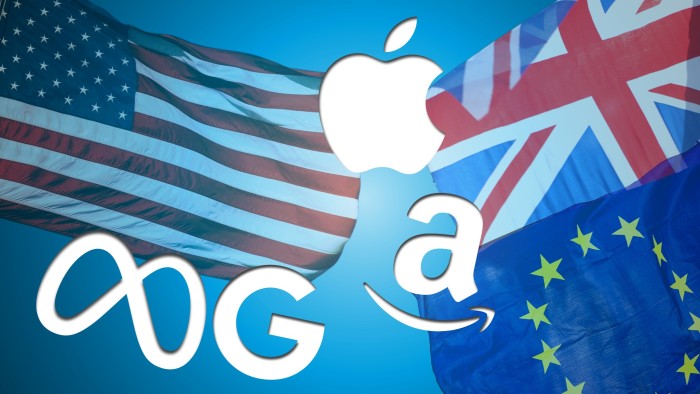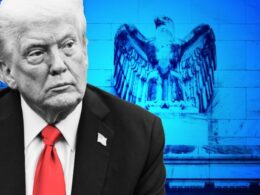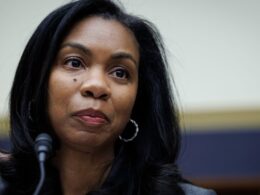US and European antitrust enforcers used to work so closely that Jonathan Kanter’s office in Washington was adorned with an elephant knitted by his then EU counterpart Margrethe Vestager.
That camaraderie has all but evaporated as Donald Trump’s new team has taken charge. Far from cuddly toys, the main transatlantic exchanges between regulators in recent months seem to be barbed criticisms.
Andrew Ferguson, chair of the US Federal Trade Commission, this week chose a conference established to foster collaboration between regulators to chide “Brussels bureaucrats” for seeking to stifle enterprise and clip the wings of American business.
“In almost every category by which one would assess competitiveness, Europe lags in some way behind the US,” he said on Wednesday at the International Competition Network conference in Edinburgh. “There is no doubt that Europe’s heavy regulatory hand is at least partially to blame.”
The comments mark a turning point in a transatlantic partnership that had steadily grown closer in the digital age, reaching a peak under Joe Biden’s presidency with Kanter at the Department of Justice and Lina Khan at the FTC.
The open question is whether the drastic change of tone will have concrete effects, hampering efforts to check the corporate power of vast, complex technology groups that stretch across multiple jurisdictions.
While close cross-border co-operation once spooked dealmakers, a potential breakdown in relations and the policy uncertainty that would bring may be equally alarming, say lawyers in Europe and the US.
“If anyone thinks that US/EU tensions will provide certainty, [they are] simply kidding themselves,” said a senior US mergers and acquisitions lawyer, noting a fragmented system can cause even more problems.
Washington’s messaging comes as the UK Competition and Markets Authority has been directed to take greater account of UK interests, raising further questions on whether co-operative trustbusting efforts may be dented.
“We have moved from a moment of global co-ordination to a time where it seems like the agencies will have to be more nationalist in their outlook,” said antitrust lawyer Liza Lovdahl Gormsen.
“This is not necessarily a good development . . .[it] could lead to protectionist outcomes that harm consumers and the global economy.”
The Edinburgh speech was not the first time Ferguson railed against Europe but it was perhaps the first to a room packed with European regulators.
In a heated exchange after his speech, Ferguson told Andreas Mundt, the veteran president of Germany’s Bundeskartellamt competition authority, that European regulators should not “assume everything is going to be bad”. Instead he urged them to take a more positive outlook, waiting for evidence of harm rather than proactively intervening.

Mundt later told the Financial Times: “We should not give too much weight to policy rhetoric . . . in practice there is more common ground than divergence.” An individual close to Ferguson disputed the characterisation of the exchange with Mundt.
EU competition chief Teresa Ribera told reporters in Edinburgh that she thought Ferguson had misunderstood the EU’s main digital regulation, adding that “in any case what I appreciate is mutual respect”.
A senior Trump administration official said Ferguson “has a very intimate and deep understanding of [the EU’s Digital Markets Act], which is why he has spoken so forcefully against these onerous regulations in Europe”.
EU officials are indeed trying to remain optimistic, pointing to Trump’s antitrust officials embracing the tough enforcement stance against Big Tech that was unleashed during the Biden administration.
The DoJ is continuing litigation against Google, which US courts found to be a monopolist in online search and advertising. The FTC has taken Meta to court over allegedly building a monopoly by acquiring Instagram and WhatsApp — accusations the company rejects. Lawsuits against Apple and Amazon are also ongoing.
After hitting Apple and Meta in April with fines totalling €700mn for breaching antitrust rules, Ribera told the FT that US authorities “are taking very similar decisions on very similar cases”.
Gail Slater, the Dublin-born head of the DoJ’s antitrust division, has previously said that “antitrust enforcement is a scalpel and regulation is often a sledgehammer” — a phrase repeated by Ferguson in Edinburgh.

But she was notably more conciliatory than Ferguson in her own appearance in Scotland. In a “fireside” chat with CMA chief executive Sarah Cardell, she sought to emphasise the “powerful network” that the ICN provided, of which the DoJ is “honoured to be a part”. “Please come visit with us,” she said to the assembled regulators.
Some experts argue that any US-EU friction may focus on rulemaking, rather than merger control or antitrust enforcement. Washington is pushing for deregulation while Brussels is trying to “rely more on forcing large tech firms to comply with a set of upfront rules to boost competition,” said Zach Meyers of the Centre on Regulation in Europe, a think-tank.
Still, lawyers in the US and Europe are keeping a close eye on potential forks in antitrust policy.
“If consensus breaks down between Brussels and DC there is serious trouble,” one former European competition official said. “But I don’t think that will happen.”
Sustainability may be one flashpoint with Washington. A former climate minister, Ribera has said she wants mergers that would ultimately help “providing sustainable goods and equipment”.
This is a break from the Trump administration, which is suing US states to block “burdensome and ideologically motivated” climate laws.
Questions over transatlantic co-operation come as multiple authorities are examining their approach to antitrust, and the limits of merger control.
UK Prime Minister Sir Keir Starmer, for instance, has pledged to ease the burden of regulation hampering investment in the country.
Following the unceremonious replacement of its chair in January, the CMA pledged to move faster on mergers and review fewer global deals where the UK is not a central player.

Cardell last month flew to the US to meet Ferguson and Slater. The meetings went well and Ferguson was impressed by Cardell as compared with some of her European counterparts, according to two people familiar with the matter.
Still, while the US may be taking a softer line towards the UK — Ferguson in Edinburgh notably focused on the EU’s DMA and failed to mention London’s newly-introduced digital markets legislation — tensions may stem from new CMA powers.
The regulator can now designate companies with an outsized position in certain digital markets as having “strategic market status”, and impose certain conduct requirements. The CMA is investigating Google and Apple with a view to potentially handing them such a designation.
While the hard policy implications of the transatlantic divergence has yet to unfold, the rhetoric seems to already be having an impact.
One senior European official in Edinburgh said they were surprised by Ferguson’s negative tone, particularly at an event designed to foster collaboration between global agencies.
“He comes to Europe and criticises Europe and then leaves,” the official said. “I would never do that.”
Source link









